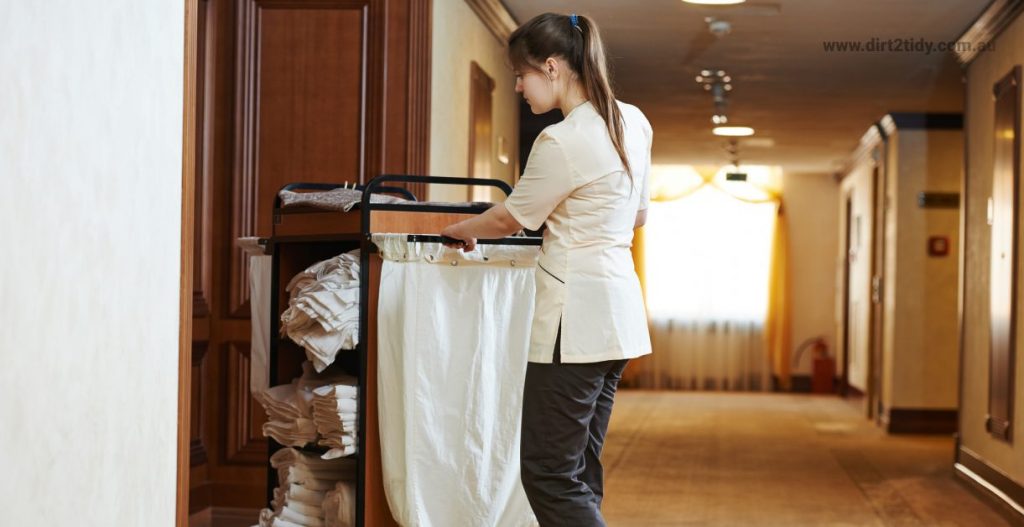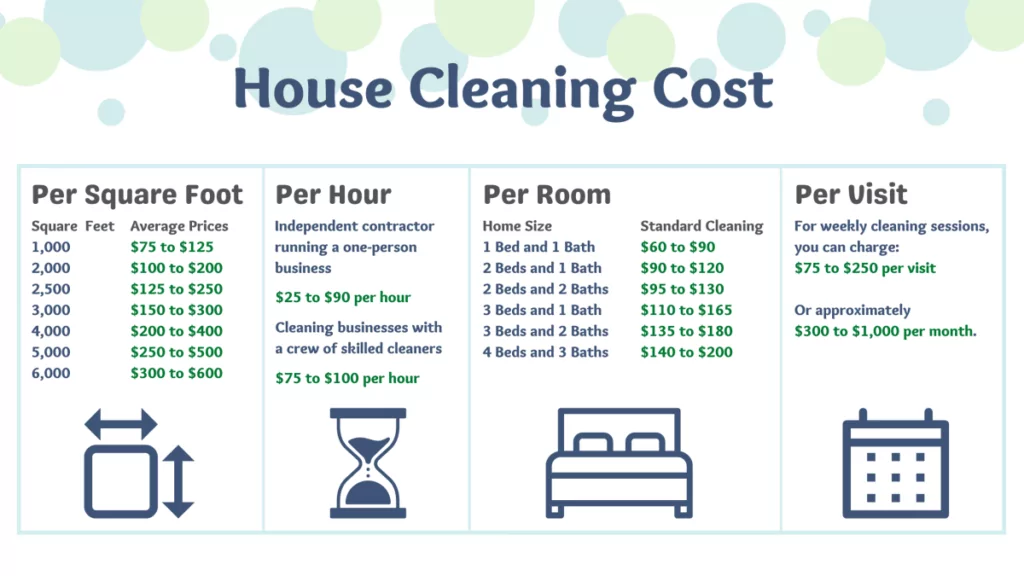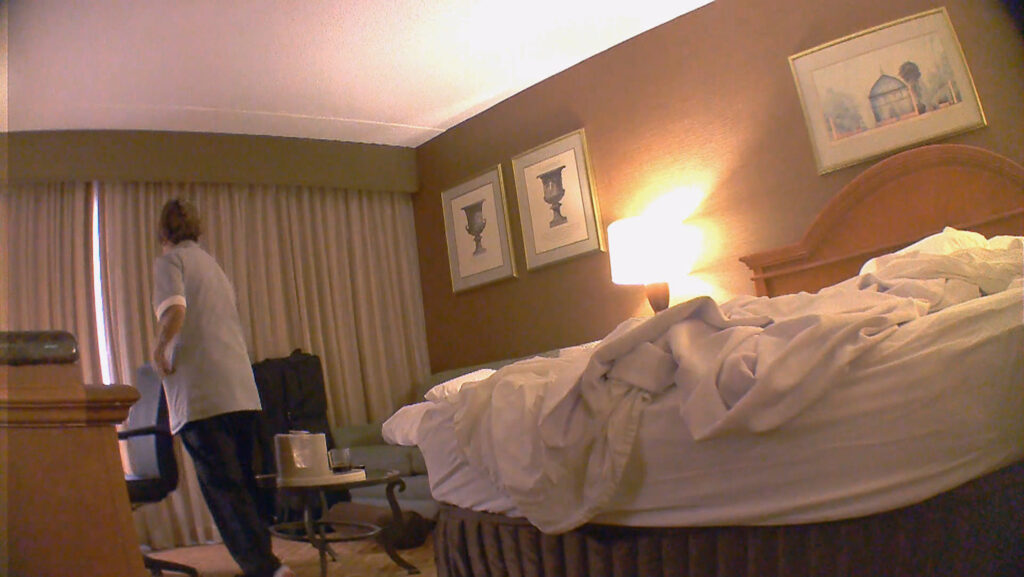So, you know how you’re always amazed by how clean hotel rooms are? And you’re like, “How do they do it? It’s like magic!” Well, my friends, I hate to break it to you, but there’s no magic involved. It’s all about efficiency and hard work. In fact, there’s actually a recommended number of rooms that a housekeeper should clean per hour. But, don’t worry, we’re here to spill the cleaning secrets and give you all the details in this article. Ready or not, here we go!
Now, before we get into the nitty-gritty of room cleaning, let’s talk about the importance of speed and accuracy. You see, housekeepers are like the superheroes of the hospitality industry. They have to clean rooms quickly, but also make sure everything is spotless. It’s a delicate balance, my friends. And the magic number for how many rooms a housekeeper should clean per hour is… drumroll, please… around 14 to 16 rooms. Yep, you heard it right. That’s approximately one room every 3 to 4 minutes. Talk about a cleaning marathon!
But hold on a second, you might be thinking, “How on earth is that possible? Are housekeepers superheroes or something?” Well, my friends, they might as well be. You see, they have their own little tricks up their sleeves. They use color-coded cleaning kits, efficient cleaning techniques, and they even prioritize certain tasks to make the most of their time. It’s an art, really. And don’t worry, we’ll dive deeper into all these secrets in the rest of this article. So stay tuned, my cleaning enthusiasts!
So, there you have it, the answer to the burning question of how many rooms a housekeeper should clean per hour. It’s all about speed, accuracy, and a little touch of cleaning wizardry. And in the upcoming paragraphs, we’ll unravel the mysteries of housekeeping efficiency and spill all the tea on the techniques that make hotel rooms shine. So, grab your cleaning supplies and get ready to clean like a pro. Because, my friends, a spotless room awaits!
Importance of Efficiency
Efficiency is a key factor in the housekeeping industry. As housekeepers, we strive to ensure timely cleaning, maximize productivity, and meet guest expectations. These aspects are crucial for the smooth operation of any accommodation establishment. In this article, we will explore the factors affecting cleaning speed, industry standards, average cleaning time, optimizing cleaning procedures, structuring cleaning shifts, training and experience, utilizing technology, and the importance of monitoring and feedback.
Ensuring Timely Cleaning
Timeliness is essential in the housekeeping industry. Guests expect their rooms to be clean and ready for their arrival, and a delay in cleaning can lead to dissatisfaction. As housekeepers, it is our responsibility to efficiently clean and prepare the rooms within a specified timeframe. This not only ensures guest satisfaction but also helps in managing the overall workflow of the housekeeping department.
Maximizing Productivity
Efficiency plays a significant role in maximizing productivity. By adopting streamlined workflow techniques and utilizing suitable cleaning tools, we can enhance our productivity levels. This allows us to clean more rooms in a shorter span of time, thereby increasing the overall efficiency of the housekeeping department. However, it is important to strike a balance between speed and quality to maintain high standards of cleanliness.
Meeting Guest Expectations
Guest satisfaction is of utmost importance in the hospitality industry. Cleanliness is one of the primary factors that guests consider while evaluating their overall experience. By ensuring efficient cleaning, we can meet and exceed guest expectations. This not only leads to positive reviews and recommendations but also helps in building a loyal customer base.
Factors Affecting Cleaning Speed
Several factors can affect the speed at which housekeepers clean rooms. It is important to understand these factors to effectively manage cleaning time and increase efficiency.
Room size and layout
The size and layout of a room can significantly impact the time required for cleaning. Larger rooms may take longer to clean as there are more surfaces to be dusted, vacuumed, and sanitized. Additionally, rooms with complex layouts may require more time to navigate and clean efficiently. It is important to factor in these variables when determining the number of rooms a housekeeper can clean per hour.
Degree of cleanliness
The degree of cleanliness required for each room can also affect cleaning speed. Some rooms may require a deep clean, while others may only need a quick tidying up. Understanding the level of cleanliness expected for each room allows us to allocate the appropriate amount of time for cleaning.
Type of amenities
Different types of amenities in a room can also impact cleaning time. Rooms with additional features such as a kitchenette, living area, or multiple bathrooms may require extra time and effort to clean. It is important to consider these amenities when estimating the number of rooms a housekeeper can clean per hour.

This image is property of dirt2tidy.com.au.
Industry Standards
The housekeeping industry adheres to general guidelines provided by hotel associations, but there may be variances in different types of accommodations. These standards help maintain a consistent level of cleanliness and service across the industry.
General guidelines by hotel associations
Hotel associations provide guidelines for housekeeping procedures, including cleaning standards and best practices. These guidelines serve as benchmarks for the industry and help ensure that cleaning processes are efficient and effective. By adhering to these standards, we can maintain high levels of cleanliness and guest satisfaction.
Variances in different accommodation types
Different types of accommodations, such as luxury hotels, budget motels, or vacation rentals, may have different cleaning standards and expectations. It is essential to understand the specific requirements of each property and tailor cleaning procedures accordingly. This ensures that we meet the unique needs of each establishment and deliver a high level of service.
Average Cleaning Time
The average time taken to clean a room can vary depending on factors such as room type and individual cleaning tasks. Understanding these average times can help in estimating the number of rooms a housekeeper can clean per hour.
Based on room types
Different room types may require varying amounts of time for cleaning. For example, a standard hotel room may take around 30-45 minutes to clean, while a suite with additional amenities may take 45-60 minutes. By considering the average cleaning times for each room type, we can better manage our workload and ensure efficient cleaning.
Considering individual cleaning tasks
Cleaning tasks within a room can also impact the time required for overall cleaning. Tasks such as changing linens, sanitizing surfaces, vacuuming, and restocking amenities all contribute to the time spent on cleaning. By efficiently organizing and executing these tasks, we can optimize cleaning time and increase productivity.

This image is property of dirt2tidy.com.au.
Optimizing Cleaning Procedures
To improve efficiency, it is essential to optimize cleaning procedures. By streamlining workflow techniques and utilizing appropriate cleaning tools, we can enhance our productivity levels.
Streamlining workflow techniques
Efficient workflow techniques can significantly increase cleaning speed. Proper organization, sequencing, and division of tasks can minimize time wastage and improve overall efficiency. By streamlining our workflow, we can ensure that each cleaning task is completed in a logical and systematic manner.
Utilizing suitable cleaning tools
Using suitable cleaning tools is crucial for efficient cleaning. From vacuum cleaners to microfiber cloths, the right tools can make a significant difference in cleaning speed and effectiveness. Investing in high-quality, time-saving tools can help us maximize productivity and ensure thorough cleaning.
Structuring Cleaning Shifts
Another aspect of optimizing cleaning processes is structuring cleaning shifts. Balancing workloads and providing adequate break times are essential for maintaining efficiency.
Balancing workload
It is important to allocate an appropriate number of rooms to each housekeeper to ensure a manageable workload. Overwhelming housekeepers with excessive cleaning tasks can lead to burnout and a decline in productivity. By balancing workloads, we can maintain efficiency and ensure quality cleaning.
Providing adequate break times
Housekeeping is a physically demanding job, and it is essential to provide adequate break times for rest and rejuvenation. Fatigue can negatively impact productivity and the quality of cleaning. By allowing sufficient time for breaks, we can ensure that housekeepers are energized and perform at their best.

This image is property of dirt2tidy.com.au.
Training and Experience
The impact of training and experience should not be underestimated in the housekeeping industry. Knowledge and skills play a crucial role in improving efficiency and delivering high-quality cleaning.
The impact of knowledge and skills
Well-trained housekeepers possess the necessary knowledge and skills to perform their tasks efficiently. By continuously improving their skills through training programs, housekeepers can enhance their understanding of cleaning techniques, equipment usage, and industry standards. This knowledge empowers them to clean rooms more effectively and expeditiously.
Continuous learning for improvement
The housekeeping industry is constantly evolving, and it is important to keep up with the latest trends and techniques. Continuous learning ensures that housekeepers stay updated with the best practices and innovative cleaning methods. By embracing a culture of continuous improvement, we can enhance efficiency and deliver exceptional cleaning services.
Utilizing Technology
Incorporating technology into housekeeping operations can significantly improve efficiency and streamline processes.
Incorporating automation
Automation can help reduce manual tasks and improve productivity. For example, automatic vacuum cleaners can clean floors while housekeepers focus on other cleaning tasks. Additionally, automated linen tracking systems can streamline inventory management and reduce time spent on manual record-keeping.
Implementing effective management software
Utilizing management software can help optimize cleaning schedules, track work progress, and manage inventory. These software solutions provide real-time information and streamline communication between housekeeping staff and management. By leveraging technology, we can enhance efficiency and improve overall housekeeping operations.

This image is property of www.businesshue.com.
Monitoring and Feedback
Efficiency can be further improved by implementing monitoring systems and encouraging open communication.
Regular performance evaluation
Regular performance evaluations help identify areas for improvement and recognize exceptional performance. By tracking metrics such as the number of rooms cleaned per hour and guest satisfaction levels, we can measure and improve our efficiency. Constructive feedback and support from supervisors play a vital role in refining our cleaning processes.
Encouraging open communication
Open communication between housekeepers and management fosters a culture of continuous improvement. By encouraging housekeepers to provide suggestions and voice any concerns, we can address issues proactively and make necessary adjustments. This creates a collaborative environment that promotes efficiency and enhances job satisfaction.
Conclusion
In conclusion, the efficiency of housekeeping operations is crucial for the success of any accommodation establishment. By understanding the factors affecting cleaning speed, adhering to industry standards, optimizing cleaning procedures, structuring cleaning shifts, prioritizing training and experience, utilizing technology, and implementing monitoring and feedback systems, we can achieve high levels of efficiency while maintaining exceptional quality. As housekeepers, it is our responsibility to constantly strive for efficiency and adapt to individual property requirements to meet and exceed guest expectations.

This image is property of media3.s-nbcnews.com.

